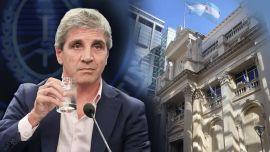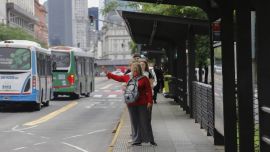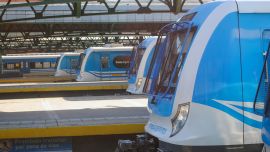Back in April, Argentina’s government gave the green light to provincial and municipal governments and private companies, granting them permission to enter the international market to purchase vaccines against Covid-19. In a context of scarcity, most Argentine governors have gone out in search of doses of various origins for their inhabitants. But provincial officials found it impossible to negotiate directly with the labs, resorting to a series of middlemen.
In the case of San Juan Province, governed by Sergio Uñac, a German company named Rul AG pledged itself to supply a million vaccines of Russia’s Sputnik V, divided equally between the first and second components, at a price of approximately 18 euros per dose – almost double the price paid by the national government for the same product in direct dealings with the manufacturers. But successive deadlines have not been met and now the western province fears losing out on both the vaccines and the money, the latter already deposited in guarantee, as confirmed by reliable sources to Perfil.
Rul AG is one of the companies authorised by the manufacturers of Sputnik V to represent them but there was no direct contact with them, which was made by the middlemen contracted by the company, Rogelio Rengel and Javier Palma. A letter of intent dated April 20 defined the price and conditions, kicking off various operations which finally never got anywhere.
This San Juan case offers a glimpse into the sensitive vaccine market, above all the various tensions generated by the race to produce and market them amid a global pandemic.
Shortages
In the vaccine market, when the operations are not state to state, the prices function on an auction basis. Bearing in mind the particular situation of shortage at the time of negotiation, San Juan agreed to a cost of 18 euros per dose or double the ex-factory price (other countries like Israel paid as much as 45 euros for vaccines of other origins under pressure of the urgency).
According to documents to which Perfil had access, the San Juan authorities deposited 18 million euros with prestigious London escrow agent The Law Debenture Corporation in concept of payment. This type of company is usually contracted in order to make the transactions safer and to protect the money should the deal fall through. They offer guarantee accounts as requested by both buyers and sellers to look after the money, only handing it over when the contract is fulfilled or otherwise returning it to its point of origin. In consequence the deposit is assured and should return without inconveniences, as occurs with deposits with a notary as guarantee.
The remittance was made by the Madrid branch of the Banco de la Nación Argentina, reaching The Law Debenture Corporation’s account in the Paris headquarters HSBS Continental Europe on May 24, with the doses due to be delivered five working days after receipt of payment by the agent of custody, according to the agreement. If the seller did not meet the deadline, there were a further three working days as a grace period, i.e either May 31 or June 3. The funds were to be released once the vaccines were officially aboard the aircraft delivering them to San Juan.
The vaccines never appeared. Two Aerolíneas Argentinas aircraft had already been reserved, ready to fly to Moscow and back with stopovers in Rome. Keen on the vaccines, the province conceded new later deadlines, although the two sides of the negotiation differ as to the dates. The intermediaries understood postponements until June 18 and 25, while the Uñac administration gave dates of June 8, 14, 18 and 25. Whatever the date, the transaction never came through for lack of the documentation which Russia was contractually obliged to deliver to San Juan to certify that the products received were authorised by Argentine health authorities for consumption in this country. After this series of failed deliveries, the provincial government scrapped the agreement, awaiting the return of the 18 million euros from the escrow account.
The provincial authorities excused themselves from making statements when consulted while Rul AG’s middleman Rogelio Rengel, told Perfil that “the million vaccines had been ready as from June 16,” adding that the San Juan government had then “asked for the paperwork for the doses to be delivered, prior to sending the aircraft,” which took almost a month.
“Governor Uñac told me that he would not send the aircraft because he was afraid of being left looking stupid and that there were people behind this who were seeking to run his career,” said the middleman, who is of Spanish origin, indicating that the governor demanded guarantees that the vaccines would be available and above board.
Provincial approaches
Last April, Uñac himself had confirmed that the province was after at least 1.6 million vaccines. At first he was thinking of contracting them with AstraZeneca lab and its Indian subsidiary with an investment of US$50-60 million. Yet the only deal sealed was this one with Sputnik, information that was not made public until now.
Others negotiated too. On June 4, Buenos Aires Province announced an agreement to buy 10 million Covaxin vaccines. City Hall and Mendoza advanced in talks with CanSino, the former for one million doses and the latter for 600,000. Salta also approached Johnson & Johnson (for a million inoculations) while Jujuy sought a million doses of Sinopharm. Until now none of these operations have materialised for any of these provinces.
This issue is coming to the fore amid repercussions for the national government after sounding off against the Instituto Gamaleya over the delays in contracted deliveries and the recent agreements with the United States labs Moderna and Pfizer.
According to the Health Ministry’s Monitor Público de Vacunación as of last Thursday, San Juan has received 638,000 vaccines, of which 537,400 have already been applied – 427,707 of the first dose and 110,773 of the second dose. Of the total received by the province, around 148,000 vaccines are Sputnik V, of which 30 percent are the second component. Health official Marita Sosa in charge of immunology indicated: “100,000 citizens of San Juan are awaiting their second dose of Sputnik V.”
The million vaccines which never were would have radically changed the health equation in San Juan. With negotiations already falling through and threatened with litigation, Rul AG have now made a final proposal to the province, offering the total of the doses contracted in the form of the second component of Sputnik V to help complete Argentina’s vaccination programme, as well as 10,000 extra doses as compensation for the delays.
It seemed easy enough to ask the provinces to go looking for their own vaccines somewhere else in the world, but international negotiations over a humanitarian item so much in demand can be very complex, leading to conflict.


















Comments